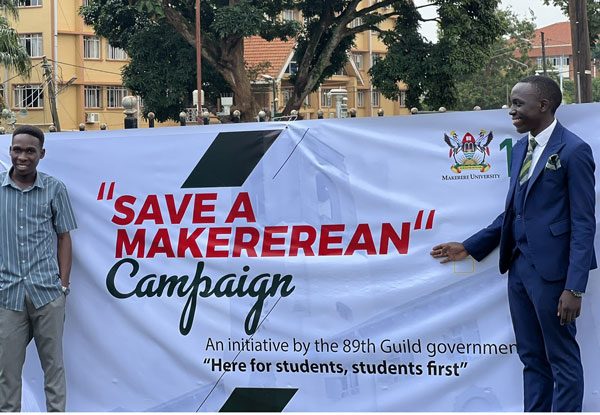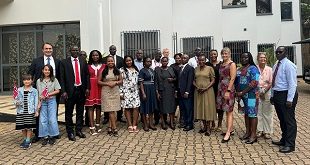
Kampala, Uganda | THE INDEPENDENT | Student leaders at Makerere University led by the Guild President Robert Maseruka have initiated a campaign dubbed “Save a Makererean” aimed at raising Shillings 1 billion to help their underprivileged colleagues on the verge of dropping out due to tuition fees. Speaking to journalists at Freedom Square on Tuesday, Maseruka said that approximately 1,000 students drop out of the institution each academic year due to tuition fees challenges.
He further disclosed that in the previous semester, he received reports that nearly 3,000 students were unable to sit for their end-of-semester exams because they couldn’t clear their tuition fees. Tuition fees at Makerere University vary depending on the academic program The fees range from Shillings 900,000 to 2.5 million with the exclusion of the functional fees, which amount to over Shillings 600,000.
These statistics align with the statement made by the University Vice-Chancellor Professor Barnabas Nawangwe in April this year while appearing before the Education Committee of parliament and confirmed that the university was consistently losing a minimum of 1,000 students each academic year due to their inability to meet tuition expenses. It is against this backdrop that students have initiated the fundraising campaign, with an ambitious goal of raising at least Shillings one billion to support students on the brink of dropping out. Maseruka said that they intend to raise money through appeals to Civil societies, Non-Governmental Organizations, Members of Parliament, and influential community members.
Speaking to URN, Professor Buyinza Mukadasi, the Makerere University Academic Registrar, said that in a bid to provide an enabling environment for students who are unable to meet their financial obligations, the management has already approved an employment students work scheme” in which, students would engage in community service within the university, and their earnings would be used to cover their fees.
According to the Makerere University tuition policy, all privately sponsored students should pay at least 60% of their tuition at the beginning of every semester and full functional fees at the beginning of the 1st Semester. “All privately sponsored first-year students should pay 60% of tuition and all functional fees before issuance of admission letters and all students should have paid 100% tuition by the end of the 6th week of the semester,” Reads part of the policy
It adds “Any student, who would not have paid 100% tuition by the 6th week, should have paid all functional fees and 60% of the tuition fees if they are to be allowed to do 60% of the course load.” Responding to this, Professor Mukadasi Mukadasi explained that students who fail to pay 100% of their tuition fees by the exam period can appeal to the Vice-chancellor for special permission to sit exams, an avenue several students have used before. However, he emphasized that such permission is not an automatic entitlement.
Mariat Namiiro, the Vice Guild President said that this financial struggle has pushed some female students into prostitution to raise funds for tuition fees but expressed hope that the fundraising campaign would alleviate this dire situation.
For a long time, several Privately sponsored students from not only Makerere University but also other higher institutions of learning have been facing tuition challenges at the beginning of the semester, mid-way, or at the end of the semester. Many of these resolve to fundraisings within particular classes where students volunteer to solicit money and save their colleagues while others apply for financial aid, which oftentimes becomes unsuccessful.
Last year, Deputy Speaker of Parliament, Thomas Tayebwa ignited a debate regarding the current government sponsorship process, arguing that it favored the affluent over the disadvantaged. He contended that the current system was disproportionately benefiting students from well-to-do families, who attended expensive schools like Mt St Mary’s College Namagunga, St Mary’s College Kisubi, and St Mary’s Kitende and attain government sponsorship cut-off points.
****
URN
 The Independent Uganda: You get the Truth we Pay the Price
The Independent Uganda: You get the Truth we Pay the Price


